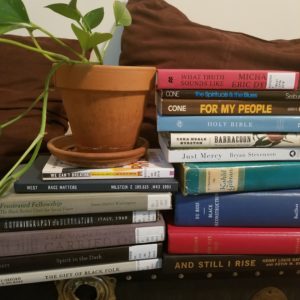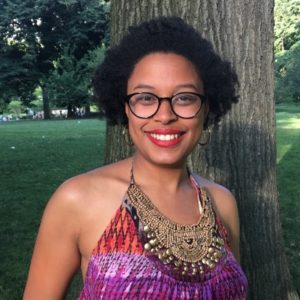Spectrum of Spirituality: On the Religious and Spiritual Experiences of Black Men and Their Relation to the Decline of the Black Church
By Alissa Rae Funderburk

The purpose of this thesis is to explore and examine the experiences and practices of black men regarding their religion and spirituality. As a religious person myself, my initial investigative question was: What does it mean for one to consider themselves spiritual but not religious, particularly given the long history of the role of religion in black culture in America? This oral history project was centered on a small sample of narrators who could speak to the subject in the greater context of their lives and family histories. Themes exposed in the course of the interviews included but were not limited to politics, health and wellness, feelings of hypocrisy within the Christian church, the history of black theology, the sway of prosperity gospel, the legacy of slavery and growing trends towards the Afrocentric. The major finding in this research has been the intertwined nature of the relationship between spiritual beliefs and the individual desire for community expressed by each narrator.
 Alissa Rae Funderburk graduated from Columbia in 2012 with a bachelor’s degree in anthropology as a John W. Kluge Scholar. Her interests included the studies of race, culture and religion, particularly those of the diaspora. In 2013, Alissa Rae began working with Hope Church NYC as the director of kids programming and as an assistant at York Prep School. Last year Alissa Rae worked as the Deputy Director of the Columbia Life Histories Project alongside its co-founder Benji de la Piedra while completing her last semester of coursework in OHMA. After submitting her thesis on the religious and spiritual experiences of black men in New York City, Alissa Rae now conducts freelance oral history work.
Alissa Rae Funderburk graduated from Columbia in 2012 with a bachelor’s degree in anthropology as a John W. Kluge Scholar. Her interests included the studies of race, culture and religion, particularly those of the diaspora. In 2013, Alissa Rae began working with Hope Church NYC as the director of kids programming and as an assistant at York Prep School. Last year Alissa Rae worked as the Deputy Director of the Columbia Life Histories Project alongside its co-founder Benji de la Piedra while completing her last semester of coursework in OHMA. After submitting her thesis on the religious and spiritual experiences of black men in New York City, Alissa Rae now conducts freelance oral history work.